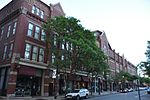Hill–Lassonde House
Buildings and structures demolished in 2016Demolished buildings and structures in New HampshireHouses completed in 1850Houses in Manchester, New HampshireHouses on the National Register of Historic Places in New Hampshire ... and 2 more
Italianate architecture in New HampshireNational Register of Historic Places in Manchester, New Hampshire

The Hill–Lassonde House was a historic house at 269 Hanover Street in Manchester, New Hampshire, United States. Built in 1850, it was a well-preserved example of Italianate styling. The house was listed on the National Register of Historic Places in 1985, at which time it was still owned by Hill's descendants. The house and carriage house were demolished in July 2016.
Excerpt from the Wikipedia article Hill–Lassonde House (License: CC BY-SA 3.0, Authors, Images).Hill–Lassonde House
Londonderry Lane, Manchester
Geographical coordinates (GPS) Address Nearby Places Show on map
Geographical coordinates (GPS)
| Latitude | Longitude |
|---|---|
| N 42.990833333333 ° | E -71.455833333333 ° |
Address
Londonderry Lane
03101 Manchester
New Hampshire, United States
Open on Google Maps







